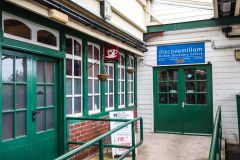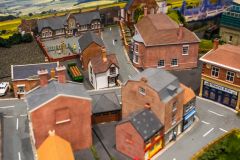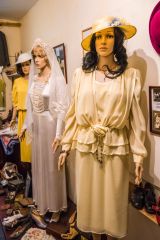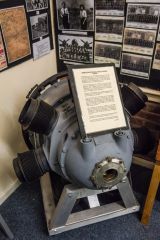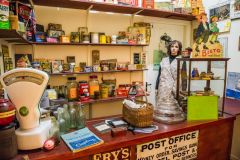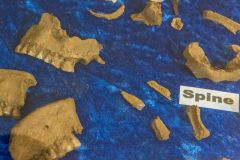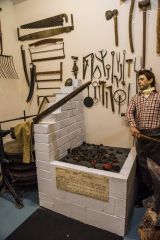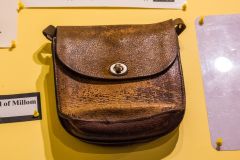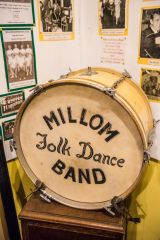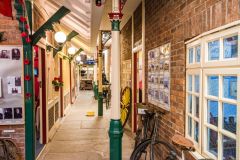
Millom Discovery Centre (Discover Millom) is a fascinating museum of local history housed in the town's railway station. The Discovery Centre crams a remarkable number of exhibits into a small space, with everything from archaeological objects to wartime fashions, from a recreated Victorian shop to the railway and its links to the town's growth.
Displays are divided into themed areas, with a central passage formed from the Victorian railway platform, decorated with beautifully painted ironwork. The central passage gives access to small rooms focussed on Railways, Rural Life, local poet Norman Nicholson, Shipping, Millom in Wartime, Archaeology and Prehistory, Fashion, Home Life, and the story of RAF Millom.
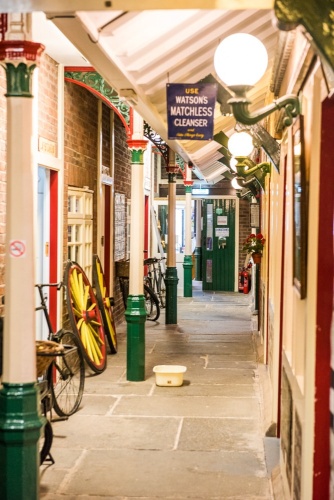
Iron Mining
Near the museum entrance is a display on the role of iron mining in Millom's development. The highlight of this gallery is the original cage used in No 1 shaft of the Hodbarrow Mines. The cage carried 8 men or up to one ton of ore (though it sometimes illegally carried up to 12 miners at a time, with the extra four men riding on top).
The cage was displayed at the Abbot Hall Museum in Kendal after Hodbarrow Mine closed, but was acquired by the Millom Folk Museum Society. The cage was driven by a steam-powered winding engine, but that engine was converted to electricity in the 1950s.
Look for the patent stops that prevented the cage from dropping to the bottom of the shaft if the winding rope broke.
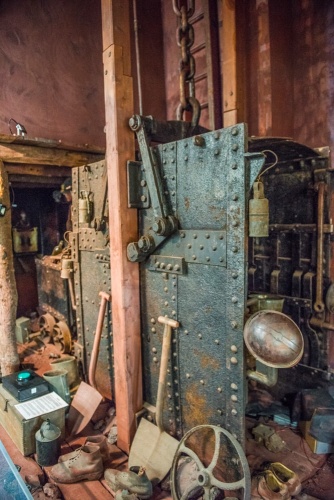
Also in this gallery is a scale model train set showing Millom - including the museum building.
The World War II gallery shows what life was like on the Home Front during the conflict. See gas masks, medals, and ration books issued to local residents.
Norman Nicholson
One of the most popular galleries looks at the life of the poet Norman Nicholason, who was born in Millom in 1914 and lived his whole life in the area. His house on St George's Street is marked with a blue plaque.
Nicholson wrote in the language he heard around him every day, and his poems are direct and simple, reflecting on local life, the mining trade, quarrying, and religion. He is buried with his wife Yvonne in the churchyard of St George's Church in Millom, a very short walk away from the Discovery Centre.
Beside the Nicholson gallery is a recreation of a traditional 19th-century blacksmith's shop, with a forge and ironworking tools. From the blacksmith's you can step inside a beautifully recreated corner shop - see how many traditional brands you can recognise! Across the passage is a recreated chemist's window display.
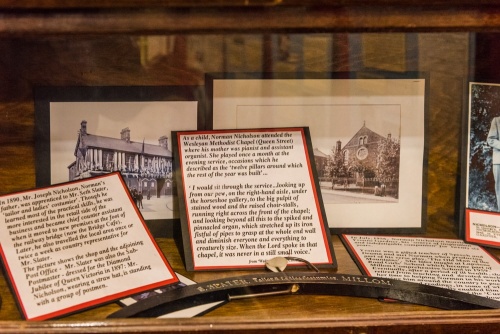
Another gallery looks at RAF Millom & Havering, which opened in 1941 as a training airfield. This was the birthplace of the RAF mountain rescue service that has saved so many lives over the years. Here you will find the wingtip of L6446, which crashed on 27 June 1941 near Stranraer, Scotland.
The pilot and crew survived the crash, and most of the plane was recovered. In 1982 the Dumfries Aviation Museum excavated the crash site and found this wing tip still embedded in the earth. The wing tip is signed by veterans o RAF Millom, making it a very unusual autograph album.
Another RAF Millom exhibit is an Armstrong Sidley Cheetah Radial engine from the Avro Anson AX293 which crashed into the sea on 8 February 1943, killing all five crew members. The engine was recovered in 1992. The propeller from the aircraft acts as a memorial to those who died while flying from RAF Millom and for those who served in the mountain rescue team stationed there.
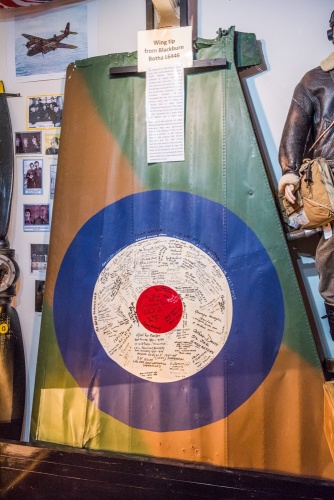
Another poignant exhibit is a section of the undercarriage winding mechanism from an Avro Anson EG686 that crashed in 1994 on a flight from RAF Cark. The plane crashed on the slope of Swirl How near Levers Water near Coniston, and all four crew members were killed.
Then there is a recreated cottage from the mid-1900s and a display of fashions worn in Millom dating back to the late Victorian period.
The Millom Room looks at schools and leisure in Millom, while the Early History gallery looks at the prehistory and archaeology of the region. Here you will find the Hodbarrow Bones, a collection of four skeletons discovered at Hodbarrow Point. The bones are thought to date to the Bronze Age. The Shipping Room takes a look at the story of the Crab Marsh Point Pier, once the hub of a thriving industry transporting iron ore across Britain.
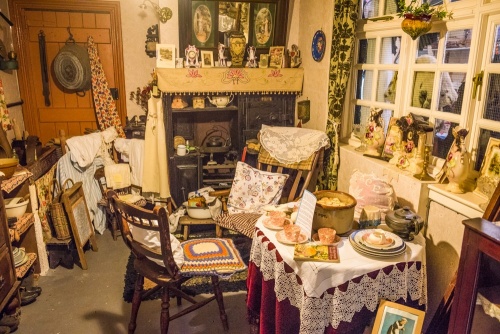
Finally, there is the Rail Room, where you can trace the history of Cumbrian Railway and how the arrival of the railway helped transform Millom. See a railway model and a wealth of historical objects linked to the railway line.
Though small, the Millom Discovery Centre packs in a lot of information. We particularly enjoyed the RAF Millom display and the Hodbarrow Bones.
Getting There
The Millom Discovery Centre is located in the Millon rail station on Station Road (the A5093). There is limited parking at the station (as we discovered to our chagrin), but you should be able to find parking along nearby streets as we did.
About Millom Discovery Centre
Address: Station Building, Station Road, Millom,
Cumbria,
England, LA18 5AA
Attraction Type: Museum
Location: At the rail station on Station Road (A5093). Limited parking spaces.
Website: Millom Discovery Centre
Email: info@millomdiscoverycentre.co.uk
Location
map
OS: SD172802
Photo Credit: David Ross and Britain Express
HERITAGE
 We've 'tagged' this attraction information to help you find related historic attractions and learn more about major time periods mentioned.
We've 'tagged' this attraction information to help you find related historic attractions and learn more about major time periods mentioned.
Find other attractions tagged with:
NEARBY HISTORIC ATTRACTIONS
Heritage Rated from 1- 5 (low to exceptional) on historic interest
Millom, St George's Church - 0.1 miles (Historic Church) ![]()
Swinside Stone Circle - 4.8 miles (Prehistoric Site) ![]()
Broughton-in-Furness, St Mary's Church - 5 miles (Historic Church) ![]()
Dalton Castle - 5.1 miles (Castle) ![]()
Dalton-in-Furness, St Mary's Church - 5.1 miles (Historic Church) ![]()
Duddon Iron Furnace - 5.2 miles (Historic Building) ![]()
Furness Abbey - 6 miles (Abbey) ![]()
Bow Bridge - 6.4 miles (Historic Building) ![]()
Nearest Holiday Cottages to Millom Discovery Centre:
More self catering near Millom Discovery Centre
